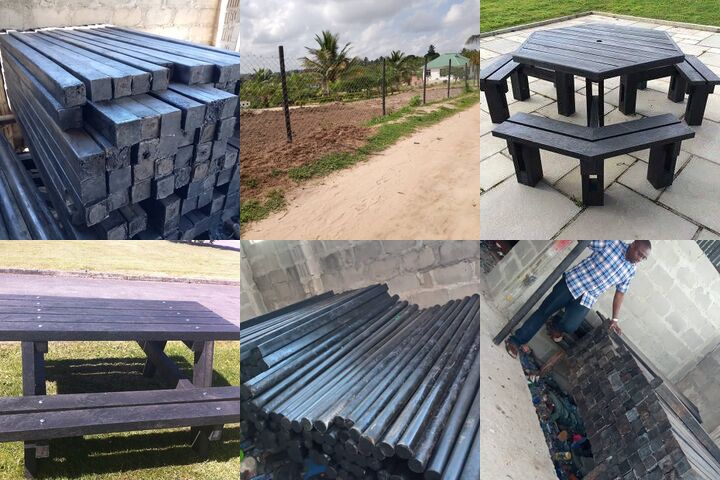Sustainable Plastic Timber
The Problem
Every year more than 9 million tones of plastic garbage end up in our oceans causing threat to marine life, and by the year 2050 there could be more plastics than fish in the ocean, Plastic pollution doesn't just hurt marine species. It's also harmful to people. As plastic debris floats in the seawater, it absorbs dangerous pollutants like PCBs, DDT and PAH. These chemicals are highly toxic and have a wide range of chronic effects, including endocrine disruption and cancer-causing mutations. Solid waste management is one of the environmental problems that most cities are struggling to manage. As the number of residents in most cities is increasing so is the production of solid waste. Very unfortunate, effective environmental and sustainable measures to manage the waste are lacking. On the other hand, Deforestation is a big problem, it is estimated that Earth's total forest area continues to decrease at about 13 million hectares per year. In our country we saw our forests are fast depleting, the growing demand for timber in building and construction activities was putting a lot of pressure on the country’s forests. But we realized that If only we could produce an alternative product to timber that was strong, longer lasting, cheaper and environmentally sustainable, we could definitely profit from the profitable timber market while helping to save forests and preventing plastic waste and packaging materials ending into oceans.
Our Proposal
We have developed a chemical free, and energy conserving technology to recycle and transform post consumer plastic garbage, packaging materials and agricultural waste into durable and long lasting plastic timbers, Plastic timbers are affordable alternative to wood timbers, hence reduces the need for building material manufactured from wood, helping to preserve forests, cut down on deforestation and further mitigation of climate change. Our technology is environmental friendly, that uses natural profiled waxy ( from the bees) inversion in the plastic extrusion process set at different temperatures, the technology helps plastic materials of different polymers reach their melting point quickly while retaining their original stability and strength, hence low energy consumption resulting to low production costs, enabling production of plastic timber which are 32% less compared to price of wood timber, the technology converts more than 12 different types of plastics and packaging materials, producing durable, long lasting, termite resistant plastic timbers used in building and construction estimated to last more than 60 years without replacement whether used in sunny areas, marine or in water applications. We are simply the pioneer of chemical free and energy conserving plastic extrusion technology in Africa.
We Assume that...
eco-friendly Products
Constraints to Overcome
Normally the challenge with the plastic extrusion process is it takes time, which increases energy consumption and increases production costs, this situation has been a major challenge to many plastic extrusion facilities in different parts of the world, hence this has forced those facilities to use chemicals to speed up the extrusion process, these chemicals in turn pollutes the environment. We have developed a chemical free, and energy conserving plastic extrusion technology called “Waxy ӀӀ technology” The technology solves both issues, it uses natural substance – natural profiled waxy (from the bees) which are inverted during the extrusion process set at different temperature, helping plastic materials of different polymers reach their melting point quickly while retaining their original stability and strength, hence low energy consumption resulting to low production costs. We are simply pioneering the chemical free and energy conserving plastic extrusion technology in Africa.
Current Work
We are currently raising funds to able to acquire bigger machines of high production capacity so that we can be able to manufacture an average of 400 plastic timbers per day so as to meet the current market demand and start our expansion / scaling plan.
Current Needs
Resource Mobilization and fundraising.
